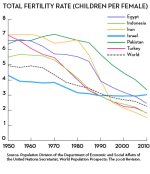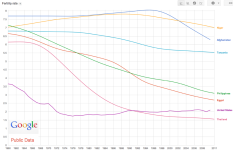All that I am saying is that because of declining birth rates there will be fewer workers paying the payroll taxes that are used to pay the old age benefits, unless Germany and eventually the US increase immigration. It is a simple concept.
That is only necessarily a problem if you assume constant productivity. If you allow for productivity to grow (and to outgrow the proportion of retirees to the total population), even a 90% payroll tax doesn't have to be a problem: Because producing stuff becomes cheaper, workers might well be able to buy all they're buying now and then some with what they take home.
I don't understand why I am being bombarded with complaints that I am equating wealth with manufactured goods or to think of the entire world as single resource, a bizarre, useless idea or that inflation suppresses wages or that because retirees don't produce anything it means that everyone else who does produce has to do with less stuff.
If you know how to wean economies off of pursuing growth as a goal, start a thread about it and I will participate.
If you believe continued growth is a sustainable model in the long run,
you should start a thread over in the Science forums disproving exponentiation; alternatively, you might want to disprove the notion that the speed of light is unsurmountable.
Continued growth is
not a workable long-term strategy. A growth of even on tenth of a percent, within a mere 100,000 years, implies a multiplication of the population by a factor of 2.5571013e+43. For comparison: The visible universe contains about 10e+25 stars. In other words: In order to accomodate that many people, you'd need to put 10^18 times the current population of the Earth around
every single star in the visible universe. Unfortunately, you'd barely have reached the other end of our galaxy by then. That is, at the speed of light.
Meanwhile allow me to state this simple concept without having to correct all of the mistaken ideas on how the economy operates.
Simple doesn't mean right.


